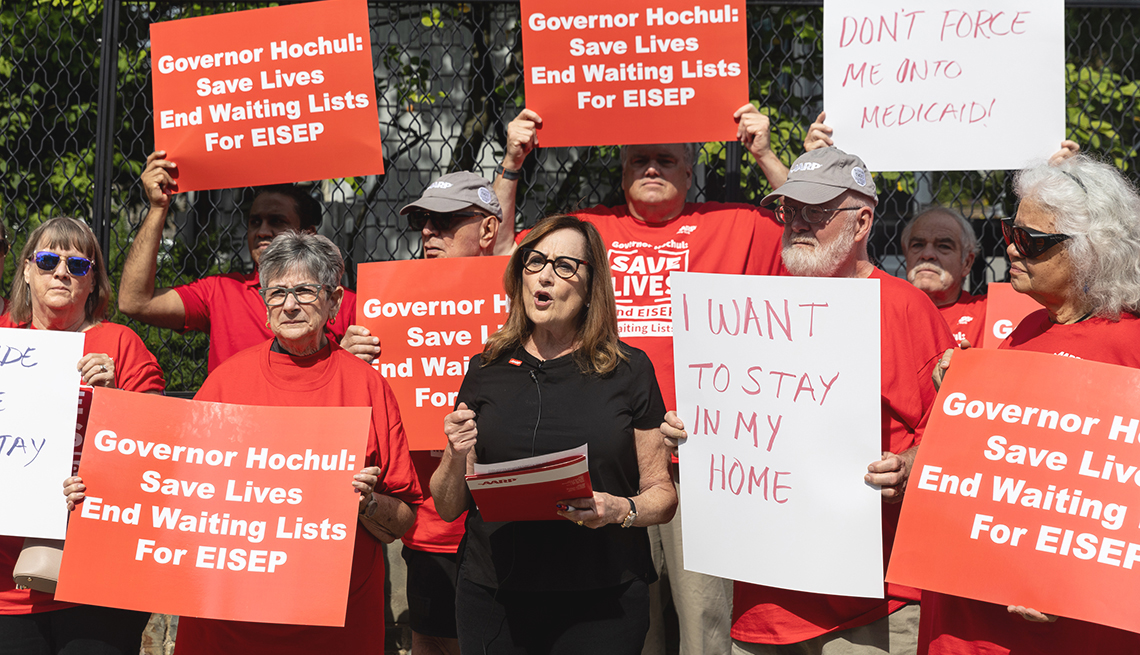AARP Hearing Center

Don Baylies remembers feeling his heart drop when he saw the out-of-pocket cost — $995 — for the mood stabilizer he takes for post-traumatic stress disorder.
“There’s no way ... to pay that kind of money,” says Baylies, 79, a retired Amtrak head repair technician who lives south of Syracuse. “You’d have to do without the drugs if you had to pay that.”
Because he couldn’t afford the copay, Baylies skipped his medication and endured about a month of scary mood swings. He resumed taking it only after switching his prescription to the U.S. Department of Veterans Affairs, which pays the entire cost.
“I don’t know why the United States can’t do something” about high prescription drug costs, says Baylies, an Air Force veteran.
AARP is hoping New York soon could. Passing legislation to require the state to develop a plan and seek U.S. Food and Drug Administration approval to import drugs from Canada ranks among AARP New York’s top priorities for the 2025 legislative session beginning in January.
Another goal for AARP: More state funding to expand in-home services, such as cooking and housekeeping, for older residents who need such help. Because of long waiting lists, some applicants for such programs had to enter nursing homes or even died before receiving help, according to a 2023 report by the New York State Office for the Aging.
Other priorities include increasing nursing home monitoring, protecting older New Yorkers from financial exploitation and making roads safer for pedestrians, cyclists and transit riders.
“Overall, it’s about protecting the health and safety of older adults,” says Kristen McManus, an advocacy director for AARP New York.
Prescription drugs in the U.S. cost nearly three times as much as those in 33 comparable countries; they are more than twice as expensive as in Canada, according to a 2024 federal report.

That’s largely because Canada and other countries negotiate with drug companies on a large scale, giving them significant leverage, says Bill Ferris, an advocacy director for AARP New York.
A 2019 AARP survey of New York registered voters age 50 and older found 62 percent had concerns about prescription drug costs. Of those who said they’d left a prescription unfilled during the previous two years, 60 percent said cost was the reason.
“It is totally and completely unacceptable to AARP for someone to skip taking a prescription drug because of cost,” Ferris says.
Ten states — including Colorado, Maine and New Mexico — have passed laws directing the state to establish a drug importation program or to study the idea, according to the National Conference of State Legislatures and AARP. Florida’s plan, which in January became the first approved by the FDA, includes medications for some chronic conditions and people in some state health programs.
If the anticipated New York bill becomes law, Ferris says, it’s unclear which medications the state would include in its plan. It likely would take several years for the state to secure all approvals before prescription drugs could flow across the U.S.-Canada border, he adds.
A New York drug importation bill stalled in the legislature the past three years amid resistance from the pharmaceutical industry. Stami Williams, a spokesperson for Pharmaceutical Research and Manufacturers of America, says importing prescription drugs from Canada would fall “dangerously short” of ensuring the “safety, accessibility and affordability of prescription medications.”
“The idea of state importation proposals, and this bill specifically, will once again fail to deliver on its promises,” Williams said in an email.
The FDA has said state plans must show they “significantly reduce” drug costs “without imposing additional risk to public health and safety.”
Katherine Shaver has worked as a journalist for more than 30 years, including 26 years at The Washington Post.































































